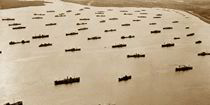We take a look at what was said in the market in the past week.
“As you can imagine these past three months have been the most challenging and difficult in our company’s history. The cruise industry remains incredibly safe and maintains one of the best safety records of any form of recreational travel in the world.”
Carnival Corp’s Micky Arison makes an attempt to explain away the rather inconvenient fact that one of his cruiseships is lying on its side off the Italian coast.
(Protesters swarm Carnival meet)
“We understand people’s anger. We understand the candlelight processions, the protests. But we want to appeal to the common will to find a solution and hope that this letter, written in sincerity can be recognised as an effort to find a way to resolve the problems.”
The shipowning families behind Deiulemar Compagnia di Navigazione try to put out the fire over the company’s finances that have led to demonstrations on the streets of Torre del Greco.
(Deiulemar principals in appeal to bondholders)
“He is an extremely talented shipping guy but has really only been firefighting since he joined in late 2010.”
Sydbank analyst Jacob Pedersen takes a sympathetic view that Torm chief executive, Jacob Meldgaard, was just unlucky to be caught in a blaze or maybe even a conflagration.
(Torm announcement sparked progress)
“Our intention is to operate our tanker fleet to the end of its useful life; however, the cash flow difficulties that we are experiencing may require us to sell vessels earlier.”
A sober assessement of the outlook for Evangelos Pistiolis’ Top Ships from the company’s own annual report.
(Top Ships teeters on the brink)
“Given consensus forecasts of future conditions in the freight market, we do not expect significant improvements for the tanker industry in 2012. Rates in the spot market and time-charter rates will remain under pressure, as a result of the imbalance between supply and demand. The market value of tankers looks set to remain at historic lows.”
But Sovcomflot chief Sergey Frank is cautiously optimistic about his own group’s prospects.
“We are willing to sell at the right price but we are not in a hurry.”
Is a good price not enough right now for Samco Shipholding’s Bengt Hermelin.
(Samco to beef up Nova VLCC pool)

Vale’s Jose Carlos Martins sparks the idea that the Brazilian mining giant is thinking of a 100 strong fleet of 400,000-dwt ore carriers.
“We do believe that China’s demand for iron ore is such that the carrying equivalent of 100 of these ships will be needed for transport but we are not looking to construct anymore right now and we are not encouraging anyone else to do so either.”
But the idea that a splurge of giant ore carrier orders is in prospect is firmly put down by Vale’s Murilo Melo.
“I’ve gone from being completely shocked to being elated. It was a very busy couple of weeks. I was on the phone non-stop the first week putting out calls, and the second week was pretty much negotiations.”
Shipping analyst, Natasha Boyden, celebrates finding a new desk at Global Hunter Securities just a couple of weeks after being fired by Cantor Fitzgerald.
(Boyden raring to go in new Global Hunter role)
“It’s a two tier market. Now we are no longer where we used to be. The new fuel efficient ships are going to be earning substantially more money simply because it’s a saving for the charterer.”
Technomar’s George Youroukos gets down to the detail of service speeds and bunker consumption as he explains the logic behind his new containerships.
(‘Big fuel saving’ for eco-boxships)
“The container charter market is at the turning point of a meaningful rate recovery driven by an improving global trade and strong US imports, recent capacity reductions across all major routes as liners’ profitability came under pressure and steep increases in liners’ freight rates.”
Morgan Stanley analyst, Fotis Giannakoulis, is upbeat about prospects for Greek containership owner Costamare
“In liners there’s a lot of fungibility and flexibility between the different size ranges. So when you’ve over ordered on big ships and under ordered on smaller ones, it doesn’t mean smaller ones will do well and the big ones badly. It means the liner companies come under pressure to redeploy - which is exactly what’s happening now.”
Clarksons analyst Trevor Crowe sees hope for the liner business in vessels cascading down to less commercially important trades.
(Cascading: delight for some but doom for others)
“The cost of a ship is not the only factor one should consider. We should also look at the technology. The way to go for Japanese yards is to build green ships and they have to be more advanced than their competitors.”
Japanese civil servant, Hideaki Saito, argues that shipbuilding does not have to be a sunset industry for the land of the rising sun.


